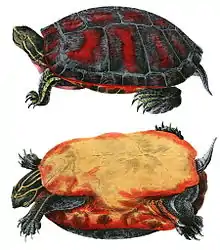Texas river cooter
The Texas river cooter (Pseudemys texana) is a species of freshwater turtle endemic to the U.S. state of Texas. It is found in the river basins of the Brazos, San Bernard, Colorado, Guadalupe, San Antonio, Nueces, and their tributaries. It is one of three species of cooters (Pseudemys) occurring in Texas, including the Rio Grande cooter (Pseudemys gorzugi) and the river cooter (Pseudemys concinna).[3]
| Texas river cooter | |
|---|---|
 | |
| Scientific classification | |
| Kingdom: | Animalia |
| Phylum: | Chordata |
| Class: | Reptilia |
| Order: | Testudines |
| Suborder: | Cryptodira |
| Superfamily: | Testudinoidea |
| Family: | Emydidae |
| Genus: | Pseudemys |
| Species: | P. texana |
| Binomial name | |
| Pseudemys texana Baur, 1893 | |
| Synonyms[2] | |
| |
Description
The Texas river cooter is a relatively large turtle, capable of growing to a shell length of 12+ inches (30.5 cm). They are green in color, with yellow and black markings that fade with age. Males can be distinguished from females by their longer tails, longer claws, and overall smaller size.
Taxonomy
The Texas cooter was once reclassified to a subspecies of the eastern cooter, Pseudemys concinna, but was given full species status in 1991.
Similar species
_and_red-eared_slider_(Trachemys_scripta)%252C_Colorado_River%252C_Travis_County%252C_Texas%252C_USA_(12_April_2012).jpg.webp)
The red-eared slider (Trachemys scripta elegans) shares its range and habits, but can easily be distinguished from the Texas cooter by red patches on either side of its head. Various species of map turtle can also look much like juvenile Texas cooters.

References
| Wikimedia Commons has media related to Pseudemys texana. |
- IUCN (2016). "Pseudemys texana". IUCN Red List of Threatened Species. 2016. Retrieved 7 December 2016.CS1 maint: ref=harv (link)
- Fritz Uwe; Peter Havaš (2007). "Checklist of Chelonians of the World" (PDF). Vertebrate Zoology. 57 (2): 196. Archived from the original (PDF) on 2010-12-17. Retrieved 29 May 2012.
- Dixon, James R. (2013). Amphibians and Reptiles of Texas: with Keys, Taxonomic Synopses, Bibliography, and Distribution Maps. Texas A&M University Press, College Station, Texas. viii, 447 pp. ISBN 978-1-60344-734-8
- Species Pseudemys texana at The Reptile Database

